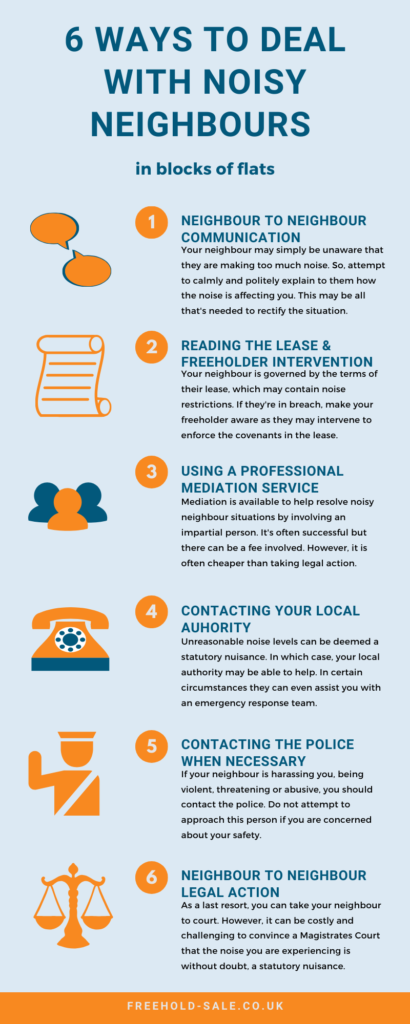Whether it’s loud music, drilling, dogs barking, or even stomping around and slamming doors, most of us would have experienced some kind of disturbing noise coming from our neighbours before. In fact, according to a recent survey by Which[1], one in four people have had a problem with noisy neighbours in the last year.
But when this noise becomes a consistent occurrence, it can be extremely frustrating and even feel as though you’re living in a nightmare. And with the fear of negative repercussions looming, it can also seem like an incredibly daunting problem to try to resolve with someone who can impact your daily life and home environment. Fortunately, there are a few steps that can be taken to prevent neighbours from continuing to be a nuisance with excessive noise.

- Neighbour to neighbour communication
It sounds so simple and yet this can be the most challenging step for people to take when dealing with their noisy neighbour. Although you may feel uncomfortable or nervous in doing so, you may find that just by explaining to the neighbour how their noise is impacting you, it will have the desired result. Your neighbour may not even be aware that they are causing too much noise and may be keen to rectify the situation.
Being successful with your communication will be somewhat dependent on your approach. Try not to be confrontational or accusatory and remember to take the moral high ground and remain reasonable and polite. It’s also best to wait a while until after the noise has occurred before discussing the disturbance with your neighbour, in order to keep the discussion as relaxed and informal as possible. Tell your neighbour how the noise has affected you and suggest alternative solutions if possible.
If you really do not feel comfortable with discussing the problem with your neighbour face to face, or if they will not listen to you, you could try writing them a letter. This will provide you with an opportunity to get your thoughts and feelings clear. You can also keep a copy of the letter as evidence of the actions that you have taken to resolve the problem.
It’s advisable to take note of every interaction that you have with your neighbour and keep a diary of the noise disturbances and how they affected you. Be as specific as you can about each incident as it may be used as evidence if you need to take matters further. If you feel in any way threatened or intimidated by your neighbour, it is advisable not to approach them and contact the police – see step five.
- Reading the lease and Freeholder intervention
Anyone living in a block of flats in England and Wales will be governed by the terms of their lease. And it is common for leases to contain covenants that restrict audible noise at certain times such as between 11 pm and 7 am. There may also be restrictions on keeping pets, using musical instruments, or having wooden floors. It’s, therefore, a good idea to check the lease, as the neighbour may be in breach.
If you are a leaseholder and believe that your neighbour is in breach of their lease, you should contact your freeholder. They will then be able to determine if the covenants in the lease need to be enforced and how this can and should be carried out.
Generally, it is the freeholder who has the power to enforce covenants within the lease, which may also indemnify them against the costs involved (therefore, leaseholders will be left with the bill, which can be costly). In some leases, however, certain covenants may be mutually enforceable which means that a leaseholder can take legal action directly against another leaseholder for breach of the covenant – see step six.
How should a freeholder deal with noisy leaseholders?
A freeholder should approach the subject with the noisy leaseholder via a formal written letter and attempt to mitigate the situation. This letter will remind the neighbour of their obligation to abide by the terms of their lease and will set out the legal consequences should they fail to comply. These include an injunction and forfeiture of their lease. While both measures can be extremely costly to see to fruition, and forfeiture incredibly difficult to achieve, the threat of either action can be all that’s needed to put an end to the noise problem.
- Using a mediation service
Mediation is a service available to help resolve difficult situations (such as noisy neighbours) by involving an impartial person. The mediator is trained to help both sides in a dispute understand each other’s perspectives and come to a resolution. This practice is often very successful.
There can be a fee for using a mediation service, but this is usually far cheaper than the costs involved with taking legal action. However, the downside is that mediation is voluntary, so the neighbour has to want to attend the meeting to resolve the matter.
To find a mediator in your area, visit: https://civilmediation.org/results/
- Contacting your local authority
Your local authority may be able to help you deal with noisy neighbours when the noise is deemed a statutory nuisance. A statutory noise nuisance is any noise that is considered unreasonable. This includes:
- Loud noise after 11 PM and before 7 AM
- Loud music and other household noise at an inappropriate volume at any time
- Consistently barking dogs
- Excessive vehicle noise such as revving car engines
After you make a complaint about the noisy neighbour, your council may take the following actions:
- Writing to the leaseholder informing them of the complaint (they will not divulge who the complaint was made by)
- Asking you to keep a detailed diary of all the noise problems that you experience
- Installing noise monitoring equipment into neighbour’s homes
- Issuing an abatement notice
An abatement notice is a legal document that informs the leaseholder that they will be prosecuted if their nuisance noise continues. Prosecution following an abatement notice can lead to a hefty £5000 fine, however, the process can be lengthy as it can take some time to establish the extent and severity of the noise problem. Leaseholders should also be aware that any official noisy neighbour complaints will go on record and may make it harder for you to sell your home.
There are some instances where your council might be able to provide you with immediate assistance to a noise problem. For example, your council may have a dedicated, emergency response team to deal with late-night music and parties. They can issue on-the-spot warnings, seize equipment and issue fixed penalty notices of £100. Furthermore, under the Noise and Statutory Nuisance Act (1993), your local authority is authorised to gain entry to a property to stop noise and to disconnect misfiring burglar and car alarms.
However, if you believe that your local council hasn’t taken the appropriate steps to resolve your noisy neighbour complaint, you can complain to the Ombudsman. This is providing that you have exhausted the council’s internal complaints procedures beforehand. You will normally need to make a complaint against your local authority within 12 months of realising that it hasn’t dealt with your issue adequately.
- Contacting the police
If the noisy neighbour is harassing you, being violent, threatening, or abusive you should contact the police as they are breaking the law. Do not attempt to approach this person if you are concerned about your safety.
- Neighbour to neighbour legal action
It is possible for leaseholders to take their own legal action against their noisy neighbour; however, this is not recommended. This is due to the fact that it can be costly and potentially very challenging as you’ll have to convince a Magistrates Court, without doubt, that the noise problem you are experiencing constitutes a statutory nuisance. If the courts agree, however, they will issue a summons to your neighbour.
Final advice
It’s a good idea to speak to other people within the building to see if anyone else is having problems with the noise and can corroborate their neighbour’s version of events. Noise problems are often one person’s word against another so it would be advantageous to have support in numbers.
Lastly, when living in a block of flats it’s not uncommon to hear noises coming from other flats in the building such as footsteps, talking and items dropping on the floor. This can occur as a result of poor noise insulation and is therefore something that leaseholders may have to gain a tolerance for unless a suitable insulation solution can be found.
Although these noises may be stressful at times for some neighbours, people are legally allowed to make a reasonable amount of noise in their own property without having to worry that they are upsetting their neighbours.
[1] https://www.which.co.uk/consumer-rights/advice/what-can-i-do-about-nuisance-neighbours


